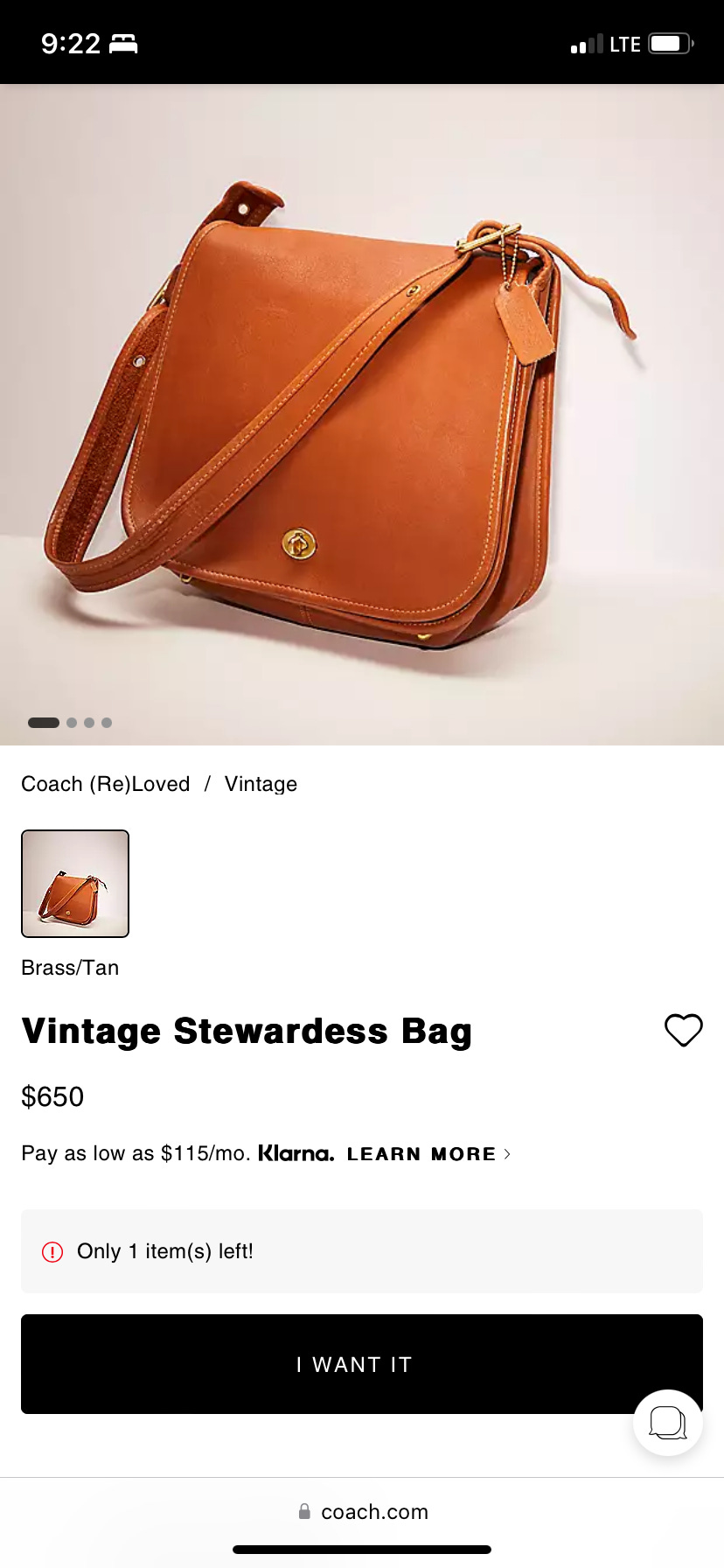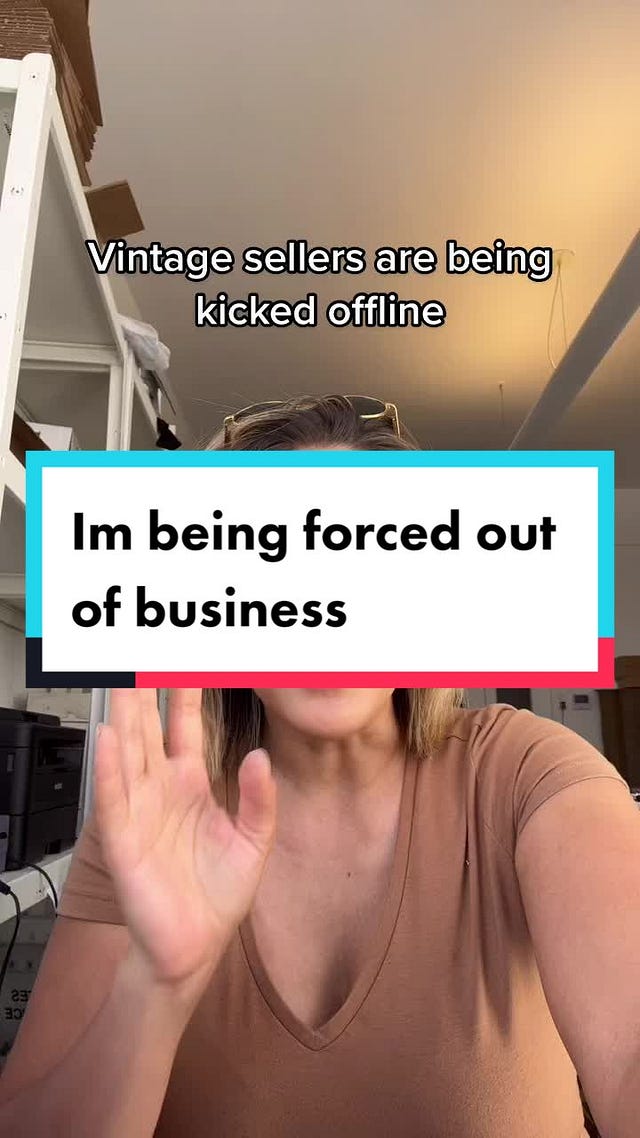indie resellers or bust
With secondhand shopping more popular than ever, the ethics of resellers are a hot topic. But as we fight about it amongst ourselves, the real villain's operate in plain sight. And get praise for it.
Every three to five business months, the conversation surrounding resellers pops up and the complaint is the same. Resellers are tAkIng all the gOoD cLoThEs from the thrift stores leaving them bare and then reselling those clothes at a markup, making it so low-income shoppers can’t find anything of good secondhand quality in the stores and are unable to afford the inflated resale cost. And as a side note, stop weaponizing low-income shoppers as a justification for why reselling shouldn’t exist; just say YOU can’t find good stuff because NEWS FLASH, lower-income shoppers for the most part aren’t looking to score trendy secondhand pieces. They’re looking to get pieces they need, a few they may want, and getting out of there.
Reselling is nothing new, from weekly garage and yard sales to brick & mortar vintage shops to the rise of online selling platforms like eBay, people hunting for discarded anything to resell for profit has been going on for decades. For years, the resale market has operated in the background of the retail space, and this peer-to-peer selling format wasn’t seen as profitable even after the success of platforms like Etsy and Poshmark because people were still buying firsthand at a massive rate. By 2018 US shoppers were on average buying 68 pieces of clothes per year; five times more than in 1980, and wore each piece about seven times before it would be discarded - something the resale market thrives on, but that’s another conversation for another day, so why waste time with old shit when we can just keep producing new shit.
But by 2019, according to a Yahoo Finance article, the resale market was projected to hit 51 billion dollars by 2024 from the 24 billion it was worth at that time, and by 2021 Stastica; as quoted in this Forbes article, reported it was worth 96 billion, nearly double and four years ahead of the 2018 projections and with that massive gain, it was inevitable big business would want a piece of the resale pie and not just a slice.
And why wouldn’t they?
In the last few years, the landscape of how we consume fashion has nearly flipped on its head. Research firm GlobalScan; as quoted in this Harvard Business Review article, reports that 76 percent of consumers shop resale with the dominant categories being apparel, electronics, and home goods. This boost in consumers preferring shopping secondhand is led by Gen Z, with Millennials close behind who together account for two-thirds of the second-hand shopping market according to a 2023 survey conducted by Globaldata for Thredup, but in general, among all generations, there is an overall push for brands to be more sustainable not just with products but with shopping formats as reported by Forbes. So with this data, what do you think businesses are going to do? They will of course get in the game, something this Harvard Business Review article makes the case for.
In 2021 Coach announced their (Re)Loved Program, as their commitment “to a better-made future” where among other things they resell vintage bags, in the same year, Banana Republic introduced BR Vintage, a capsule collection of 225 of their best-selling pieces from the 80’s to “tap into both the original BR customer and the next generation, who is obsessed with thrift shopping and secondhand” and in January 2023 J. Crew announced a wide range of resale efforts including “J. Crew Vintage”, vintage pieces; circa 80s-90s, “sourced by their design team” that are available for purchase via their Bowery and Fifth Avenue and online.

The markup they’re charging would spark a thousand TikTok think pieces if it was an indie reseller but instead, they were praised for their efforts in moving toward suitability and the “Resellers are tAkIng all the gOoD cLoThEs blah blah blah so on and so forth” crowd has been eerily quiet on the matter.
Are the poors not important to you anymore!?!?!
If they aren’t selling their vintage pieces, they’re reselling their own current ones. Nordstrom’s launched “See You Tomorrow”, their online and in-person (only housed at their NYC Flagship store), marketplace to buy pre-loved items, major fast fashion brands like Zara and Shein also joined in by releasing their own re-sale programs and because we’re so desperate for brands to take seriously the impact their production has on the environment, we look at this as a win and give them praise when in reality it’s the beginning of a major loss for both shoppers and sellers.
In 2021, TikTok creator kailaui, a former vintage dealer who had to close her vintage business due to a cyber attack, shared how she thinks her business was targeted because big businesses were entering the resale market and she was not alone. Her comment section was littered with other vintage resellers with similar stories from items being flagged to entire accounts being shut down with no explanation.
While a vast majority of people who re-sell are just trying to make a few dollars on things they no longer use, there are tons who do it part or full time and big brands coming in to push them out is a threat to their livelihood. They support themselves, their households, and in some cases employees with their businesses. While they may be big enough to support one or a few families with profits from their business, they can’t go up against big brands with endless cash to wait them out; which for some is not very long. For consumers, big brands moving in will slowly eliminate the thousands of re-sale options to choose from; that includes being able to find a seller or sellers in your budget and create a monopoly that will drive up cost and limit accessibility. Making the fantom problem people complain about very very real.
Resellers, actual people not major corporations, are the ones who care about sustainability and the circular fashion landscape and play a critical part in the fashion ecosystem. This TikTok from prettycritical does a great job of summing up why.
With an estimated 84 percent of donated clothes ending up in landfills or incinerated, I would argue we need more resellers. Thrift stores are absolutely overrun with clothing and resellers aren’t making a dent in clothing waste, not even the ones who clear out places; which by the way is a dick thing to do.
And before someone hits me with the “They produce too much, y’all mad. They resell, y’all mad. yAlL aRe NeVeR hApPy!!”, be clear I’m happy they’re becoming more aware if only because a group of experts are telling them to do it to make money. My issue is them pushing indie resells out and consumers being too stupid to see the grift for what it is and giving them the perfect cover to take over this space in plain sight.
Are their bad apples, yes but we can’t allow them to spoil the bunch because a vast majority of resellers are mindful of others who just want to snag things for themselves. Is there nuance to this topic especially when you talk specifically about plus-size clothing being in limited supply, to begin with, and people having to compete with not just resellers but straight-sized women using them to get an “oversized” fit, of course. But there are resellers who specialize in plus-sized clothes, you just have to look for them.
No solution I’m going to give is perfect, but I know this, we can’t have big brands take this part of the market over because we will lose.
Editors Note: The Banana Republic, J. Crew and Nordstrom’s collections had limited quantiles and have for the time at least, been discontinued. It is not clear if they will be coming back on a limited or recurring basis in the future.






